12 Powerful Questions to Improve Your Life
You might be feeling stuck in life. Despite your best efforts, you are constantly spinning your wheels and never making any progress toward your goals.
You’ve got a good job and supportive friends, but something is missing.
You’ve been so busy trying to keep up with everyone else that you’ve lost sight of what matters to you.
But you want to move forward, and you know that to move forward, you need to look hard at yourself and ask some tough questions.
So, if you feel stuck or uncertain about life, taking the time to reflect on yourself and ask the right questions can be incredibly powerful. In this article, we’ll explore some important questions you can ask yourself to gain clarity and direction and ultimately improve your life.
Let’s dive in.
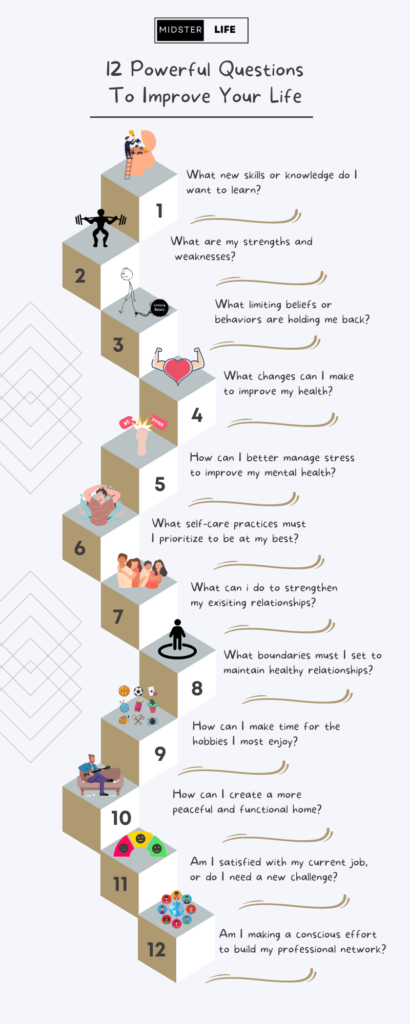
1). What new skills or knowledge do I want to learn?
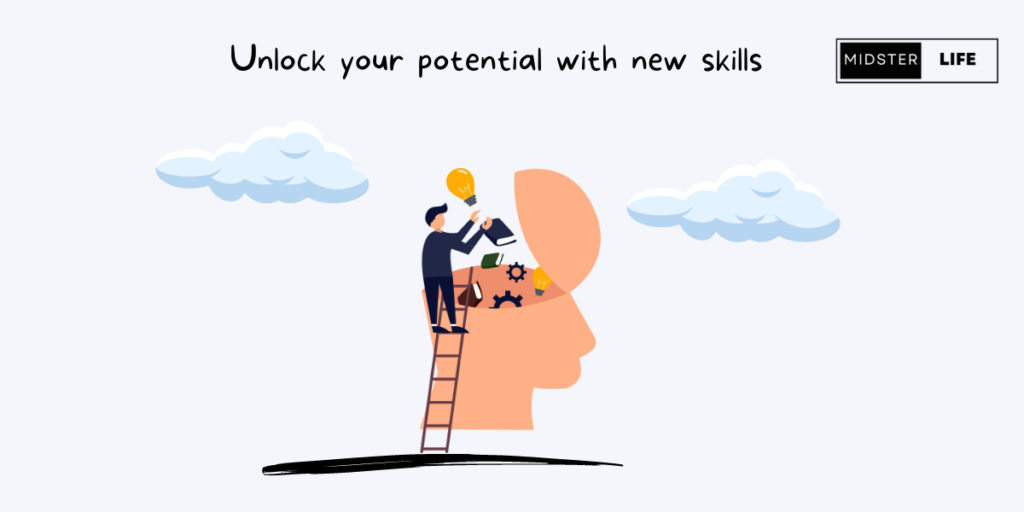
Reflect on your interests and passions. What skills would allow you to pursue new interests and hobbies?
Does your existing skill set give you the confidence to try new things, or are there things you’d like to try but fear you may not have the skills needed?
Are there specific skills in demand within your industry or desired career field? How easy will it be to acquire those skills?
Action Steps to Take
- Once you have a clear idea of what you want to learn, make a plan to learn it.
- Read books or articles on the topic, find a mentor or coach, or take a class or workshop.
- Set achievable goals and a timeline to achieve them, making yourself accountable, but be bold and ask for support along the way.
2). What are my strengths and weaknesses?
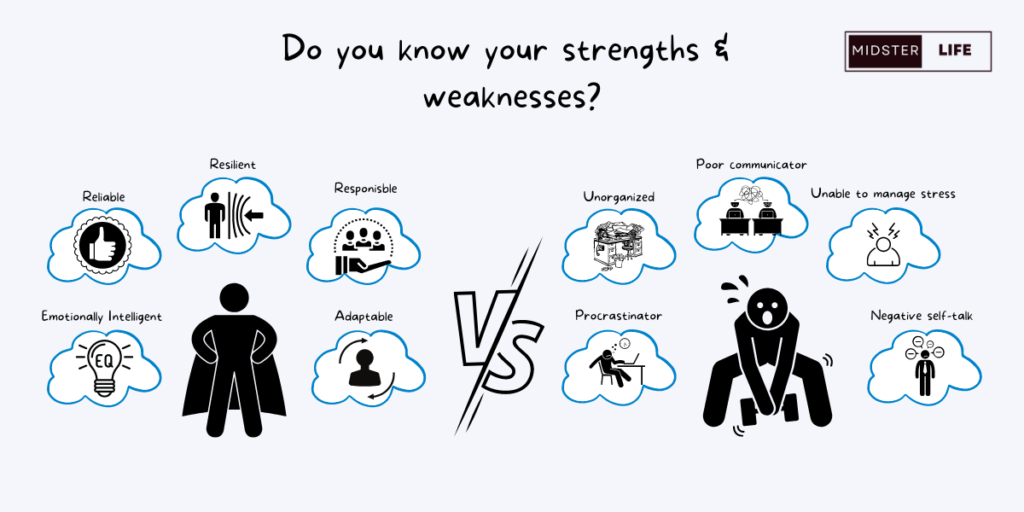
Think about how a better understanding of your strengths and weaknesses can help you achieve your personal and professional goals. Start by reflecting on your past experiences. Are there any patterns or themes that emerge? Have any skills or attributes helped you get to where you are now?
What do you excel at naturally? Are there activities you particularly enjoy and would love to do more of? Are there skills or attributes you have that others compliment you on?
What areas do you particularly struggle with? Are these areas important to you? Do you want to improve in them, or would you prefer to focus on other skills?
Action Steps To Take
Use these reflections to set realistic goals and create a plan to achieve them:
- For example, if you’re a natural leader, consider pursuing a leadership position at work or volunteering in your community.
- If you struggle with public speaking, improve your communication skills by practicing in low-stress situations or taking a public speaking course.
3). What limiting beliefs or behaviors hold me back?
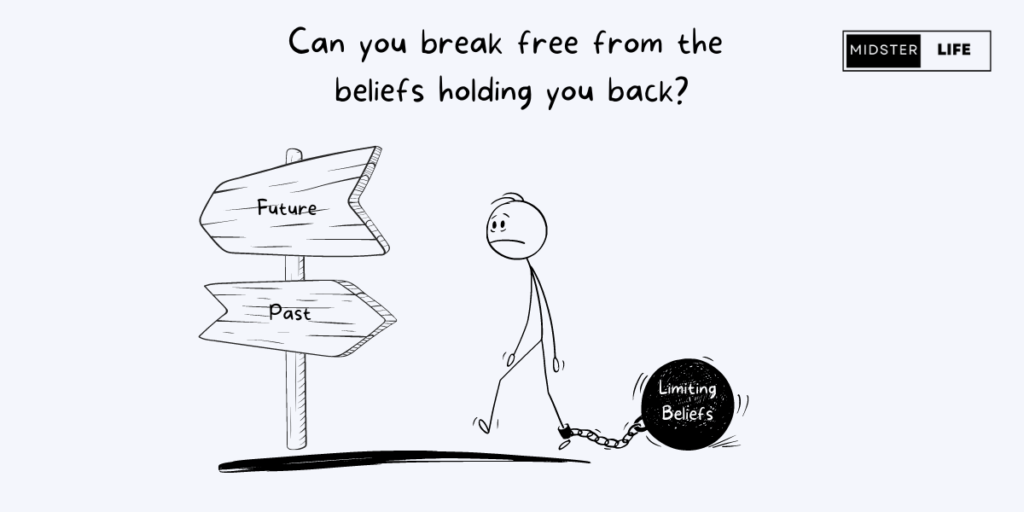
Do you have consistent negative thoughts or beliefs about your abilities? Do you find these thoughts negatively impact your behavior and decision-making? What can you do to challenge or overcome these limiting beliefs?
Limiting beliefs and behaviors can be a significant obstacle to personal growth. Start by identifying the beliefs or behaviors holding you back, such as negative self-talk or a fear of failure. Once you clearly understand these obstacles, challenge them with evidence-based thinking.
Action Steps To Take
- Challenge your beliefs by listing out your accomplishments and strengths.
- Ensure any negative self-talk is not left unchallenged. Is it based on facts? What evidence is there to support the thought?
- Seek input from supportive friends, family, or a professional therapist to help you overcome these obstacles and achieve your goals.
4). What small changes can I make to improve my health?
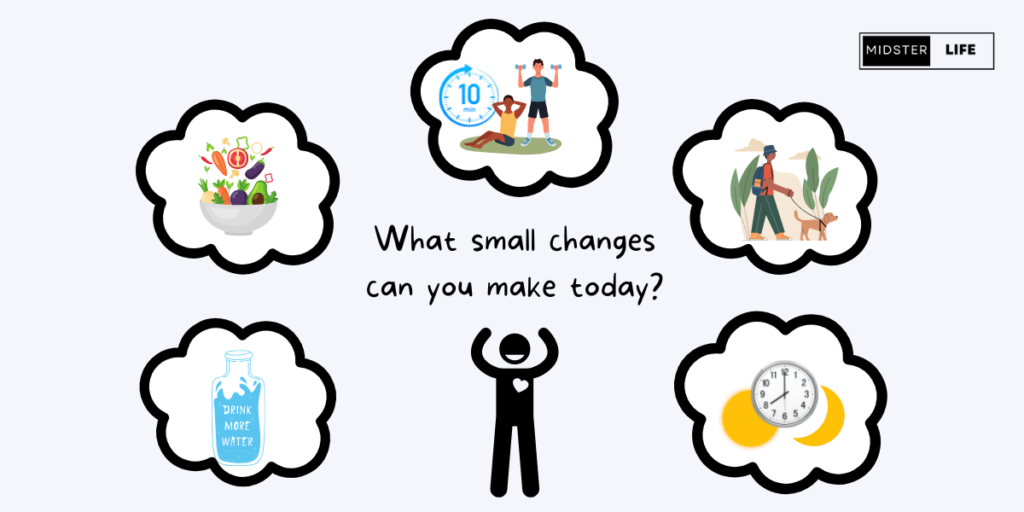
Making small but sustainable changes to your diet and exercise routine can significantly impact your overall health and well-being.
What dietary changes can you make to improve your fitness? What can cut out that you know will benefit you? If there are foods that are just too good to cut out, can you reduce how much or how often you have them?
What is your biggest barrier to exercising more? Are there any steps you can take to remove it? For example, the thought of an hour’s workout may be too much. Start by committing to 10 minutes to make it feel less daunting.
Action Steps To Take
- Identify areas where you can make healthier choices, such as swapping processed foods for whole foods.
- Commit to 10 minutes of exercise daily; start with a walk and build up to more strenuous activities.
- Seek support from a dietician or personal trainer to help you make faster progress and help you stay on track.
5). How can I better manage stress triggers to improve my mental health?

Do you know what stressors or triggers affect your mental and emotional health?
Do your biggest sources of stress come from work, relationship issues, financial stress, or a lack of self-care? By identifying the major sources of stress in your life, you can make a plan to manage them better.
Have you got some go-to activities for stress relief? If not, think about what brings calm to your life and how to make more space for it.
Action Steps To Take
- Practice stress reduction techniques such as yoga or meditation.
- Set healthy boundaries with others to allow you to remain balanced.
- Seek professional support from a therapist or counselor if you need it.
6). What self-care practices must I prioritize to be at my best?
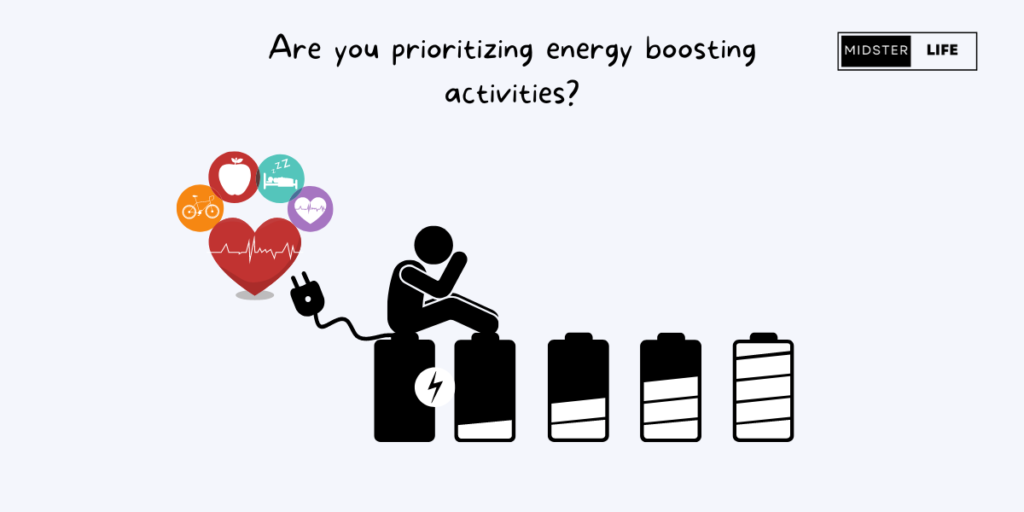
Are you clear about the self-care practices you must prioritize to feel your best physically, mentally, and emotionally?
You can improve your physical, mental, and emotional well-being by identifying the self-care practices that are most effective for you, such as getting enough sleep, eating a healthy diet, practicing mindfulness, or engaging in creative pursuits.
Action Steps To Take
- List out the most important self-care practices and prioritize them in order of importance to your well-being.
- With a clear idea of what works best for you, make a plan and set aside dedicated time for these activities in your schedule or incorporate them into your existing one.
7). What can I do to strengthen my existing relationships?
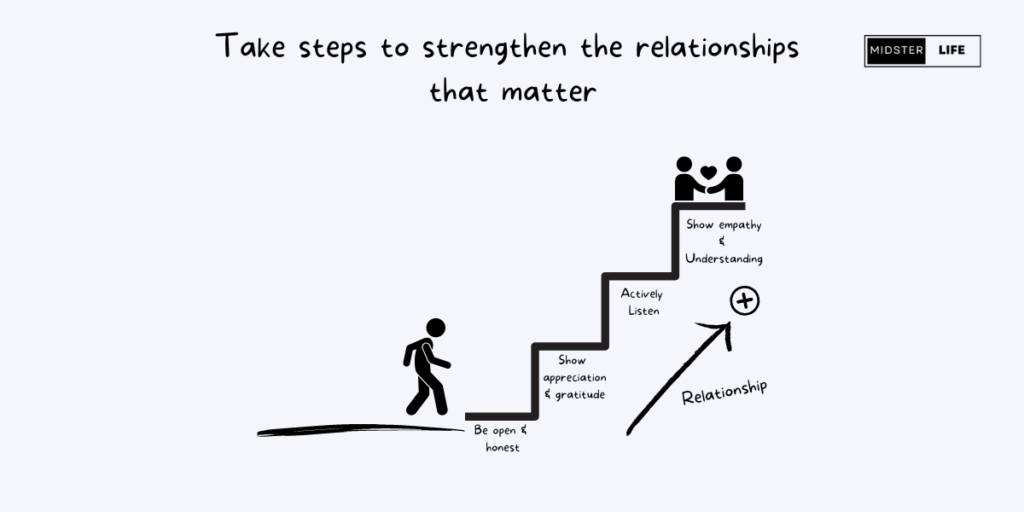
Building and maintaining strong relationships with friends and family is a continuous process that requires effort and commitment. Start by identifying areas where your relationships could be strengthened or improved, and plan to address those areas.
Excellent listening and communication skills are essential in building strong relationships with the people that are important to you. Start by actively listening to what others say without interrupting or offering unsolicited advice.
Action Steps To Take
- Have open and honest conversations with the people in your life.
- Show appreciation and gratitude for them.
- Make a conscious effort to be more supportive, understanding, and available to them.
- Show empathy and understanding, and try to put yourself in their shoes.
- Be clear and direct when communicating your thoughts and feelings, and avoid being confrontational and defensive.
Building strong relationships takes time and effort, but the rewards are worth it.
8). What boundaries must I set to maintain healthy relationships?
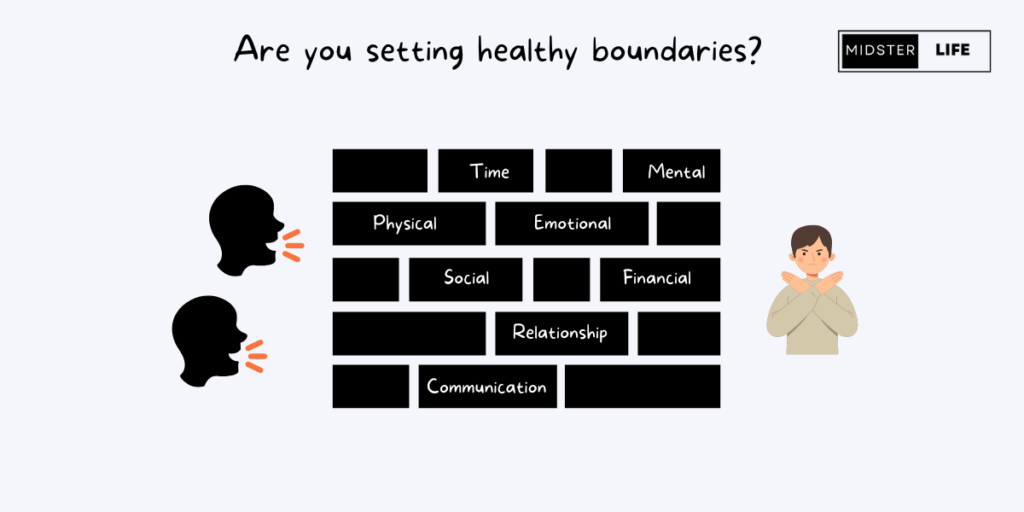
Setting healthy boundaries is essential for maintaining healthy relationships with family and friends. Boundaries help you define acceptable and unacceptable behavior from others, and they help you clearly communicate your needs and expectations.
Action Steps To Take
- Be clear about what your values and priorities are. Determine what is important to you and what you are willing to compromise on in your relationships.
- How do you want to be treated? Consider what kind of behavior you are comfortable with and what crosses the line.
- How will you communicate your boundaries? Be clear and direct when communicating your boundaries, but also be respectful and considerate of the other person’s feelings.
- Be consistent. Don’t let someone cross your boundaries without communicating your discomfort.
You can create respectful, supportive, and fulfilling relationships by setting healthy boundaries and communicating them effectively.
9). How can I make time for my most enjoyable hobbies?
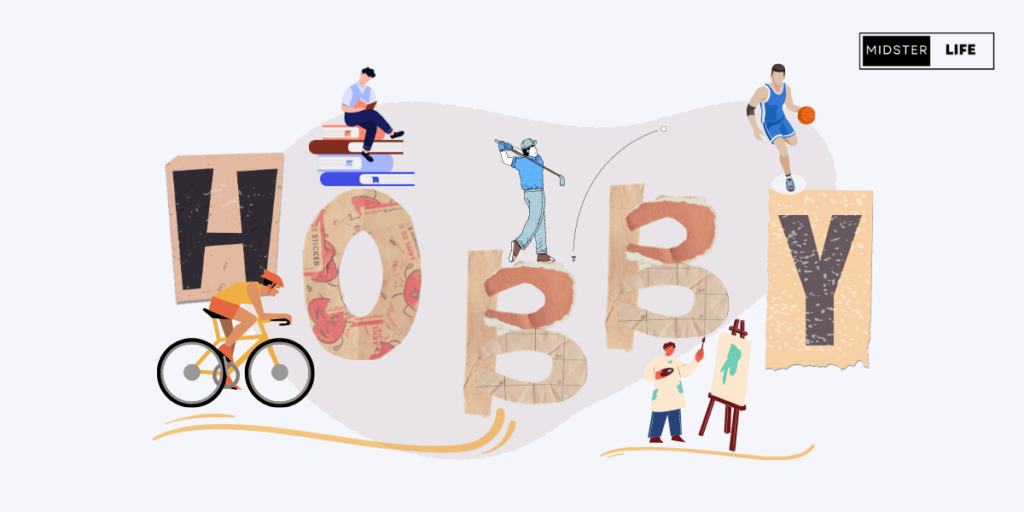
Are there specific activities and hobbies that bring you joy and fulfillment? By identifying a list of activities and hobbies you enjoy, you can then plan to incorporate these into your daily or weekly routine.
It’s ok if you haven’t got any specific passions or hobbies, now is the time to change that. Think about any areas in life where you are interested. What sort of books are you drawn to? Are there hobbies or activities you enjoyed when you were younger that you might like to try again?
Are you stepping outside of your comfort zone regularly?
Trying new experiences can be a great way to expand your horizons and enrich your life. Start by identifying areas where you feel stuck or stagnant, and list new experiences or activities that could help you break out of your routine.
Action Steps To Take
- Set dedicated time aside for hobbies and interests you know you love.
- Make an effort to learn something new. Read a book on an area of interest or sign up for a course or workshop.
- Travel to a new destination or experience parts of your own city you’ve never been to before.
- Chat with friends. Have they got any exciting hobbies you could join them in?
10). How can I create a more peaceful and functional home?

Creating a peaceful and comfortable home environment can improve your overall well-being. Start by identifying areas of your home that could benefit from changes, such as cluttered or disorganized spaces or uncomfortable or uninviting areas.
Are there improvements you can make to your home? Either small changes like updating and replacing appliances or bigger home improvement projects. If you have the skillset, this could be a chance to take on a project yourself.
Action Steps To Take
- Declutter and organize your space.
- Add plants and other natural elements.
- Create a designated area for relaxation.
- Start a DIY project to improve aspects of your home.
- Hire a contractor for any significant changes.
11). Am I satisfied with my current job, or do I need a new challenge?
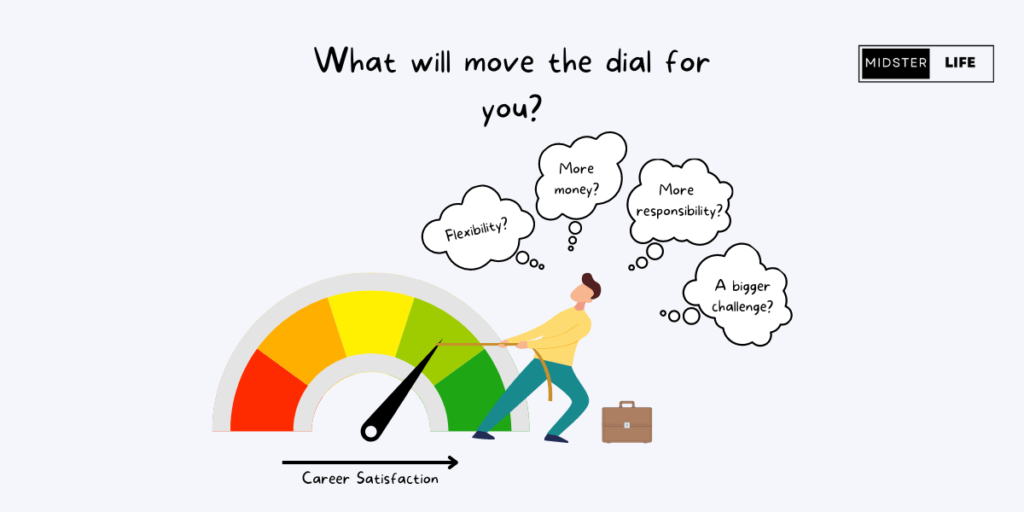
If you’re still determining whether you’re satisfied with your current job, it’s essential to take some time to reflect on your situation and explore your options.
One way to approach this is to ask yourself some key questions. Firstly, consider what motivates you and brings you a sense of fulfillment in your work. Secondly, assess whether your current job provides opportunities for growth and development and still challenges you enough.
Finally, consider your long-term career goals and whether your current job aligns with them. By answering these questions honestly, you’ll equip yourself better to decide whether to explore new career paths or opportunities.
Action Steps To Take
- Identify the tasks and aspects of your job that you find most fulfilling and enjoyable. You can identify potential career paths that align more closely with your interests and values by gaining insight into your strengths and passions
- Consider whether your role challenges you enough and whether you have the opportunity to grow. Speak with your employer and ask if there are other opportunities that you can get involved in or additional training that may make you feel more excited and engaged.
12). Am I making a conscious effort to build my professional network?
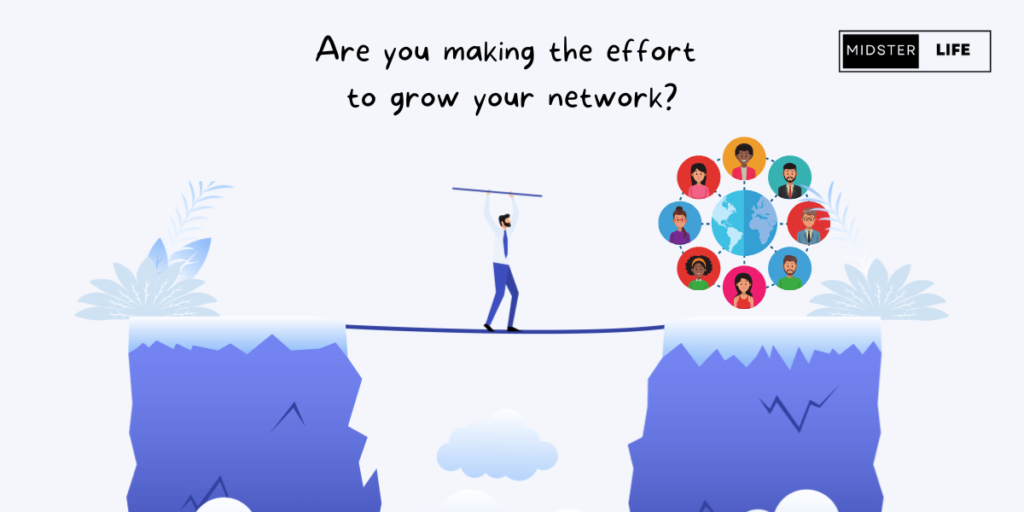
Building a strong professional network and staying up-to-date on industry trends and best practices are essential for career growth and success. If you’re unsure whether you’re putting in enough effort to cultivate your network and stay current in your field, it’s essential to take some time to reflect and assess your actions.
Action Steps To Take
- Attend industry events, join professional associations, and contact colleagues and mentors to expand your network.
- Read relevant industry publications, attend conferences or training sessions, and seek other opportunities to learn and stay current in your field.
- Start regularly engaging with others in your industry online, sharing your insights and expertise, and staying active in relevant groups and communities.
In conclusion, asking yourself these 12 questions can be a powerful tool for improving your life. It may take some time to reflect and answer these questions honestly, but the insights you gain can lead to greater self-awareness, personal growth, and a more fulfilling life.
Remember to be kind and patient with yourself as you navigate this process, and keep in mind that positive change is possible when you take the time to focus on your own needs and desires.
By using these questions as a guide, you can take steps toward creating the life you truly want and deserve.
If you are unsure which area of your life to focus on first, read this post and discover how to find greater balance in your life.


